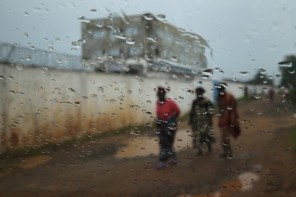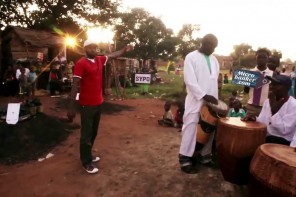In this report from Uganda (slow down! 20 clicks a month!) we learn that:
A man tried to steal a motorcycle in Kampala.
A crowd gathered.
They beat him.
Then they set him on fire.
Then the police showed up, and they fired into the crowd. Maybe they meant it to be a warning shot.
Silly policemen.
They shot two people.
One died.
Also-dead: the near-thief.
Closing line: “The shooting came just days after the humanitarian organization Human Rights Watch published a report documenting rights abuses, including torture and extrajudicial killings, committed by a branch of Uganda’s police department.”
It doesn’t sound like a ‘shooting’; it sounds like an accident. It sounds like the kind of thing that has very little to do with torture and extrajudicial killings, which are intentional violence whose patterns HRW documented in an investigative branch of the Ugandan police, made up of soldiers and intelligence officers, which strikes me as probably not the same branch called in to respond to a robbery in progress. (But then, I don’t know. But then, but then, shouldn’t the story tell me?)
So why is this in the New York Times? I have no idea, but my money is on something like, “The HRW report is a news peg, but not its own news story, so, well, here you go.” But what has this botched robbery-and-response got to do with institutionalized violence?
Meanwhile, does this story tell me anything I ‘need’ to know? Does the news value of the story outweigh the cliches (“crazy violent Africans, setting each other on fire!” “Crazy African police, shooting civilians!”) in which it traffics? Should editors even be thinking about that before they publish?
I have a certain predilection for rhetorical questions, but these are earnest. I’ve been working a hell of a lot lately, on projects I believe in and on work that just appeared, and I’ve been thinking about the discrepancies between what I think are crucial stories and what I’ve been able to sell, or what I see around me and what makes it into the news.
So I really would like to understand what news value others see, whether others see a cliche-trafficking problem or not, and if so, whether you all think that among a journalist’s obligations is weighing news value against cliche-trafficking. (I’d be especially interested in your conditions on the latter.)
PS: Read the HRW report. It’s good.




The NY Times did write a story about the HRW report: http://www.nytimes.com/2011/03/24/world/africa/24uganda.html?scp=4&sq=uganda&st=cse
So it’s not an HRW story, but still a peg of sorts. Still feels odd to me.
Maybe the police had an accident, but this was no accident:
A man tried to steal a motorcycle in Kampala. A crowd gathered. They beat him. Then they set him on fire.
I’ve seen this happen a lot in a lot of different places. And while it may have something to do with institutions — like the police not working right, or not being trusted, it also has a lot to do with the thought on the street. Mob mentality, too, can be a violation of human rights that needs to be focused on.
It may or may not have had news value in relation to the HRW report; but what happened from start to finish was terrible and illustrates something…not sure what (be very careful when you travel to Uganda?).
You’re right, Clara. That all makes sense. And I suppose a journalistic record (in foreign papers?) of abuse can help uncover a pattern for investigation (police or mob mentality). But it’s the “something…not sure what” part that bothers me — because that something can easily be what I think stories also shouldn’t be, yet another retlling of the African savage theme… If we’re not sure what we’re illustrating, should we illustrate it? (“Be very careful when you travel to Uganda” feels to me like exactly the wrong thing to illustrate, but possibly the message here — a mob responding to a thief is probably not going to impact your average tourist’s day. And it happens in all kinds of places where that story isn’t getting filed, too. So that doesn’t seem like the right reason to publish.)
I argue that a mob viciously attacking a guy on the street and the police shooting and killing people is news anywhere, period, and right to report in a timely manner. Just because it was Uganda doesn’t mean reporting it is piling on the “African savage theme.” If it was the biggest news in Kampala, why not report it?
On the other hand: this seems to have been a secondary, digested report; there’s no dateline on it, so I’m not even sure where the reporter was. And, at only 250 words, with a single attribution that may have come from a local paper, it’s not adequate to explain nuance. I definitely don’t think the HRW report is an appropriate peg for this one news brief.
But, as a news brief, it suffices. If an international newspaper purports to cover the world and is compelled to have reporting from all corners of the globe,the big news of the day out of a nation’s capital is fair game. To ignore it because it might seem stereotypical news is not right; to report it meaningfully is right. For tourists, aid workers, journalists, diplomats, etc. who read the NYT, this is a service. But, the report lacked the crucial detail of where exactly in the city this happened. To know it happened is highly valuable to me as a reader, and I can look further into local news sites to learn more. Does a 250-word blurb satisfy larger ethical concerns about fully explaining a culture and the victims and all that? Of course not. But I do think quick knowledge of the incident is helpful to some readers; as would be the larger synthesis of the incident in a fully reported piece weeks later. I think they both have a place.
.
If there’s a mob hit in the restaurant of a major Moscow Hotel, it’s a story. If there’s
Clara, you are eminently sensible… thanks for this.